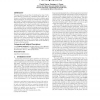Free Online Productivity Tools
i2Speak
i2Symbol
i2OCR
iTex2Img
iWeb2Print
iWeb2Shot
i2Type
iPdf2Split
iPdf2Merge
i2Bopomofo
i2Arabic
i2Style
i2Image
i2PDF
iLatex2Rtf
Sci2ools
112
click to vote
ATAL
2007
Springer
2007
Springer
Estimating information value in collaborative multi-agent planning systems
This paper addresses the problem of identifying the value of information held by a teammate on a distributed, multi-agent team. It focuses on a distributed scheduling task in which computer agents support people who are carrying out complex tasks in a dynamic environment. The paper presents a decision-theoretic algorithm for determining the value of information that is potentially relevant to schedule revisions, but is directly available only to the person and not the computer agent. The design of a “coordination autonomy” (CA) module within a coordination-manager system provided the empirical setting for this work. By design, the CA module depends on an external scheduler module to determine the specific effect of additional information on overall system performance. The paper describes two methods for reducing the number of queries the CA issues to the scheduler, enabling it to satisfy computational resource constraints placed on it. Experimental results indicate the algorithm ...
Related Content
| Added | 07 Jun 2010 |
| Updated | 07 Jun 2010 |
| Type | Conference |
| Year | 2007 |
| Where | ATAL |
| Authors | David Sarne, Barbara J. Grosz |
Comments (0)

